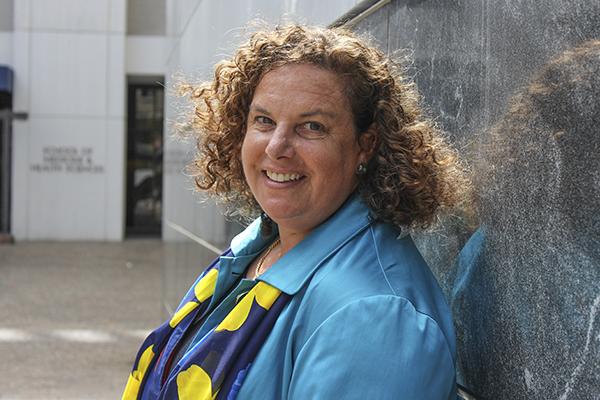Twenty-five years after completing her clinical training at GW Hospital, a new chair will be returning to lead one of the medical school’s departments.
Leslie Davidson will become chair of the department of clinical research and leadership this month, bringing more than 20 years of experience in traumatic brain injury research. She said she hopes to create partnerships between the department and other areas of GW, like the School of Engineering and Applied Science.
Davidson has worked at Shenandoah University for the last 17 years and served as the division director and an associate professor in occupational therapy, where she said she learned the skills necessary for her role at GW. She will teach her first course at GW in cognitive rehabilitation this summer and will teach a qualitative research course next spring.
“I love working with students,” Davidson said. “It is one of the things that keeps me excited about working in academia.”
Davidson said she will take time to understand GW’s culture before making big changes, and hopes to make the department a leader in health sciences.
“I really want to get a sense of what the faculty and staff, as well as the students, are really looking for with regard to that collaboration,” she said. “I don’t think that any specific department can be successful on its own. It really needs to weave its expertise with other areas.”
Davidson said she also plans to facilitate more partnerships among the School of Medicine and Health Sciences and between other programs at GW, like engineering and public health.
“One of the things that was very attractive to me for GW is that they have an engineering school, and there is so much going on right now with regard to rehab engineering,” Davidson said. “I hope to bridge that alliance.”
Davidson previously served as the clinical director of the occupational therapy and brain injury program at the Henry M. Jackson Foundation for the Advancement of Military Medicine.
Davidson said her first job was an occupational therapist at Walter Reed Army Medical Center working with soldiers suffering from concussions and moderate brain injury. She said she was later brought back to do program development for providers who would be treating concussed service members.
“When the wars broke out they needed some expertise in the area of treating service members who had concussions,” Davidson said.
Davidson also served as a faculty fellow at the Oak Ridge Institute for Science and Education, in the rehabilitation and reintegration division of the Army Office of the Surgeon General and was a subject matter expert on U.S. Army medical research and military equipment for the Command, Telemedicine and Advanced Technology Research Center.
She said she is most proud of her work with veterans who sustained traumatic brain injuries, and that she hopes to continue to work with the Army in the future in research.
“Once it is in your blood, it is in there forever,” Davidson said.
Autumn O’Hara, a professor of occupational therapy at Shenandoah University, said Davidson has been her mentor since she was in her class as a master’s student.
“She mentored me through that whole thing,” O’Hara said. “She was instrumental in my career and getting me where I am now.”
O’Hara works in hippotherapy, therapy that involves a horse, and said there are many unknown surprises that she discovered while working with Davidson.
“Once I went through school, I had her out to our ranch. She got on a horse named Cowboy and she said, ‘Giddy up,’ and she ran off on Cowboy,” O’Hara said. “There are so many different sides of Dr. Davidson that I didn’t even know.”








